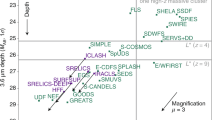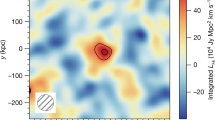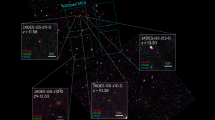Abstract
A DIRECT measurement of the magnetic field strengths within the Galaxy would be of the greatest importance for understanding its structure and evolution1, and Clark2 has proposed a method based on the effect of a magnetic field on the anomalous dispersion of 21 cm radiation passing through neutral hydrogen. I wish to point out that Clark's calculation contains a fundamental error, rendering the method much less effective than he claims.
This is a preview of subscription content, access via your institution
Access options
Subscribe to this journal
Receive 51 print issues and online access
$199.00 per year
only $3.90 per issue
Buy this article
- Purchase on Springer Link
- Instant access to full article PDF
Prices may be subject to local taxes which are calculated during checkout
Similar content being viewed by others
References
Woltjer, L., in Stars and Stellar Systems, 5, Galactic Structure (edit. by Blaauw, A., and Schmidt, M.), chap. 23 (University of Chicago Press, Chicago, 1965).
Clark, B. G., Nature, 197, 474 (1963).
Bohr, N., Peierls, R., and Placzek, G., Nature, 144, 200 (1939).
Kramers, H. A., Estratto dagli Atti de Congresso Internazionale de Fisici Como (Bologna, 1927).
Kronig, R. de L., J. Opt. Soc. Amer., 12, 547 (1926).
Author information
Authors and Affiliations
Rights and permissions
About this article
Cite this article
WAGONER, R. Critique of the “Clark Effect”. Nature 215, 943–944 (1967). https://doi.org/10.1038/215943a0
Received:
Issue Date:
DOI: https://doi.org/10.1038/215943a0
Comments
By submitting a comment you agree to abide by our Terms and Community Guidelines. If you find something abusive or that does not comply with our terms or guidelines please flag it as inappropriate.



